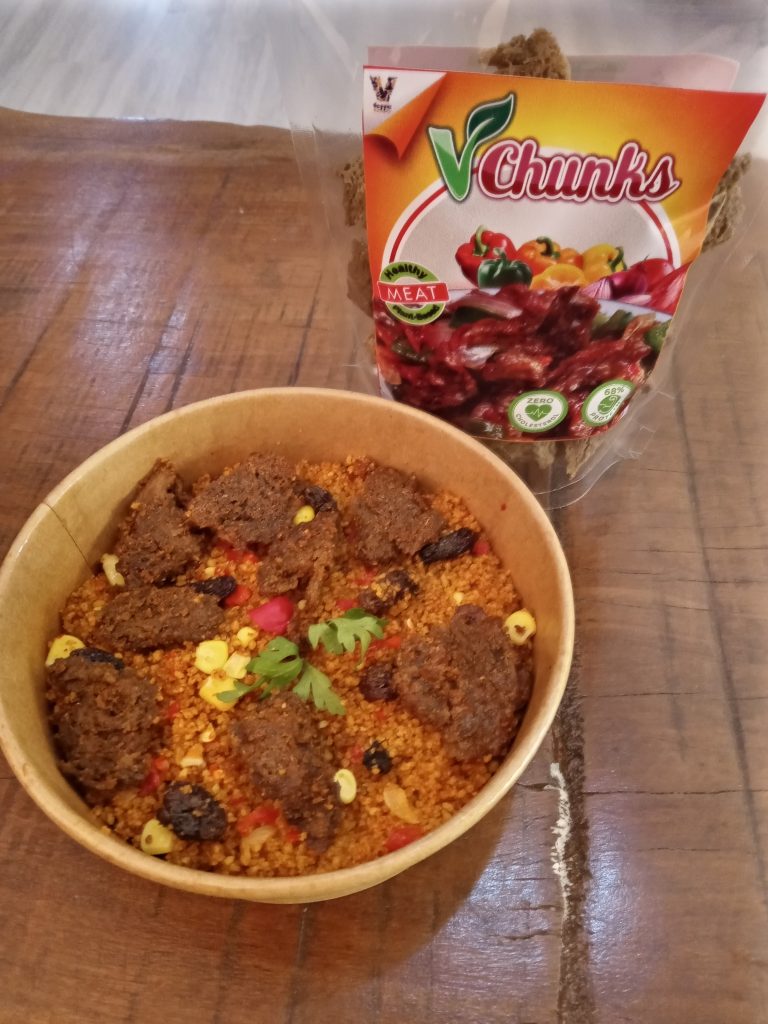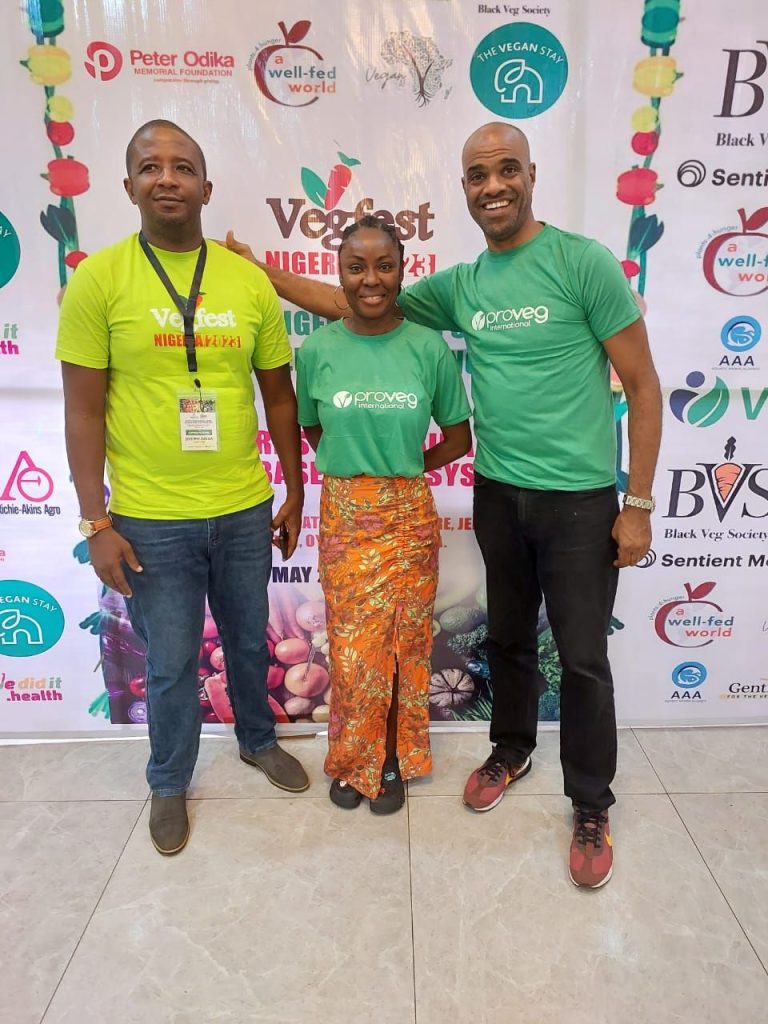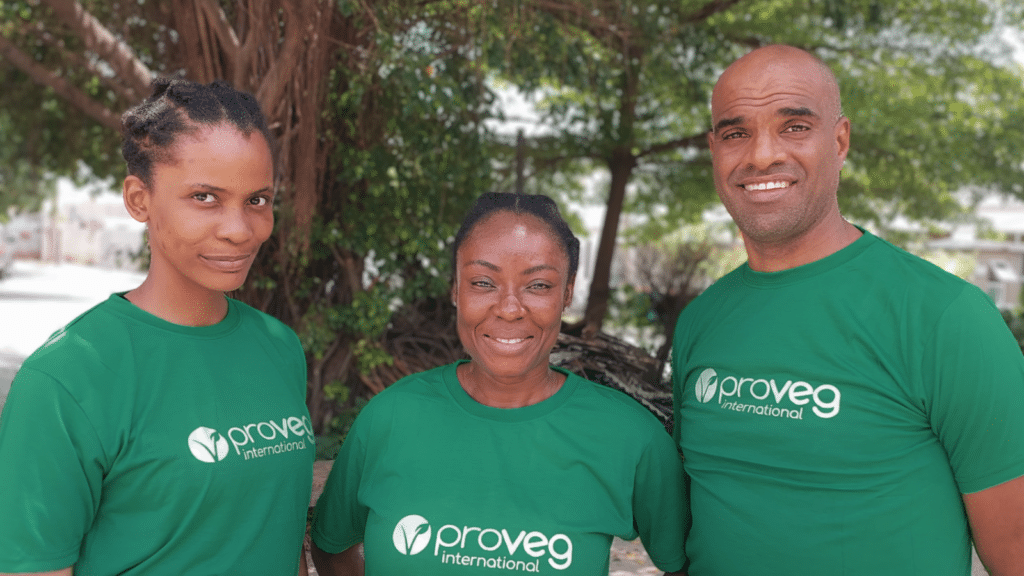Hakeem Jimo uncovers Nigeria’s untapped market for plant-based foods
With a rich food heritage, developing economy, growing bank of F&B innovators, and impressive population growth, Nigeria is one to watch as our world strives to transform the food system.
The African country is also home to the newest member of the ProVeg family! To celebrate, and learn more about Nigeria’s food industry, the New Food Hub caught up with Hakeem Jimo, the Director of ProVeg Nigeria.
An entrepreneur of many talents, Hakeem – also the founder of Nigeria’s first plant-based restaurant and brand, VeggieVictory – shared lessons and unmissable insights into unlocking Nigeria’s plant-based food industry.
Press play on the video above to watch the 20-minute interview! Or read the highlights below.
Welcome to ProVeg, Hakeem! What was it like to launch Nigeria’s first plant-based restaurant and then food company with VeggieVictory? What did you learn?
It was a bit crazy. The concept of vegetarianism – especially veganism – was completely strange 10 years ago. We initially said that ‘vegan is like vegetarian’, but vegetarianism had negative connotations. Interestingly, vegan, today, is more positive – it’s considered ‘healthy’.

What we did right with the restaurant is simply gave people the food – let it ‘do the talking’ – and people liked it. But when we talked about plant-based food, it was a very strange thing – and it still is today.
The thing is, we already eat a lot of plant-based food in Africa. I always emphasize that we eat much less meat compared to people in the Western world. It’s really more about preventing the increase in meat consumption when societies become richer – like in India and China, where they now eat more meat than they used to. So we’re not saying that ‘we are now eating vegan’ because there are already a lot of plant-based dishes. It’s just that nobody really thought about them before as plant-based dishes.
What advice would you give to start-ups that are trying to establish themselves in countries that have immature plant-based markets?
You must know your consumers – it’s what every marketing scholar will tell you. But it goes deeper. I read a remark made by a VC investor – ‘Real animal meat is emotional’. I think that, in general, eating is an emotional, cultural thing. But consuming plant-based products is a more rational decision. And when it comes to emotional against rational, you’re losing people. We need to do more than just throw products at people saying, ‘Eat this’, but really give them the experience.
How big is the current market for plant-based foods in Nigeria? And what do consumers want?
That question is too early for us, here. There is no ‘plant-based market’ yet. VeggieVictory is a first mover.
We need different approaches. In Nigeria, price parity, or even cheaper, is important because it’s a low-purchasing market. You can’t come here with premium products, because there is this ‘catching-up’ mentality – ‘I want to eat meat because most people don’t eat a lot of meat’. It’s still seen as an aspirational thing, just like, ‘I can afford a car now, I’m not only riding a bicycle,’ it’s the same outlook.

So, I think we are in a different phase right now. Market share is not yet the issue. But eventually, I believe in this Global South market, because the population numbers are here. In Nigeria, our 200 million is going to double to 400 in the next 20 years. It’s going to be the third largest country by population, right after India and China. So, if you can only get a fraction of meat consumption to switch to plant-based, then it doesn’t matter whether it’s 1% or 50% or 10%. I’m optimistic.
What is the key to unlocking the plant-based industry in Nigeria?
The African markets work differently from Western markets. It starts with the distribution. I always say you make a deal with Target, Walmart, Tesco, or Carrefour and then the next day you are in 25,000 stores. We don’t have that retailer system, here.
So, how do you even bring products to Nigerian consumers? Over 70% of food items are traded in local markets. In Europe, you don’t have markets like that anymore. They’re still very much the case in Africa. So, here, if you are in some supermarkets, you’re not on the main channel. But how do you get into open markets?

It’s a completely different story, logistically. Some products have figured it out, for example, ramen noodles, or companies like Nestlé and Unilever. So if they could push it, great, then we have a big availability task done, but they’re not doing it.
We now need small companies to push innovation, and factors to come together – awareness, funding, and distribution. Of course, the product also has to work for Africa. Plant-based burgers are probably not the right product; not everybody eats burgers in the world! It comes down to food being a cultural thing – you need to tap into that.
What next for VeggieVictory and for ProVeg Nigeria?
Plant-based companies and advocacy have the same path and goal. We need to create awareness everywhere, including in the Western world. I like that the Global North and South have to work together. For VeggieVictory, investors are coming from the Global North, not yet from Africa itself, really. Advocacy is more advanced in the Global North, but it now has to help the Global South, because we’re sitting in the same boat. We have the same – I don’t want to say enemies – antagonists, because Big Meat is coming to the Global South.

As far as ProVeg Nigeria is concerned, it’s the same thing: products, companies, and advocacy work together. You cannot convince anybody in Africa by just saying ‘Stop eating meat’; you have to say, ‘Hey, here are some great alternatives that are more fun to eat. They’re tasty and have more variety!’



